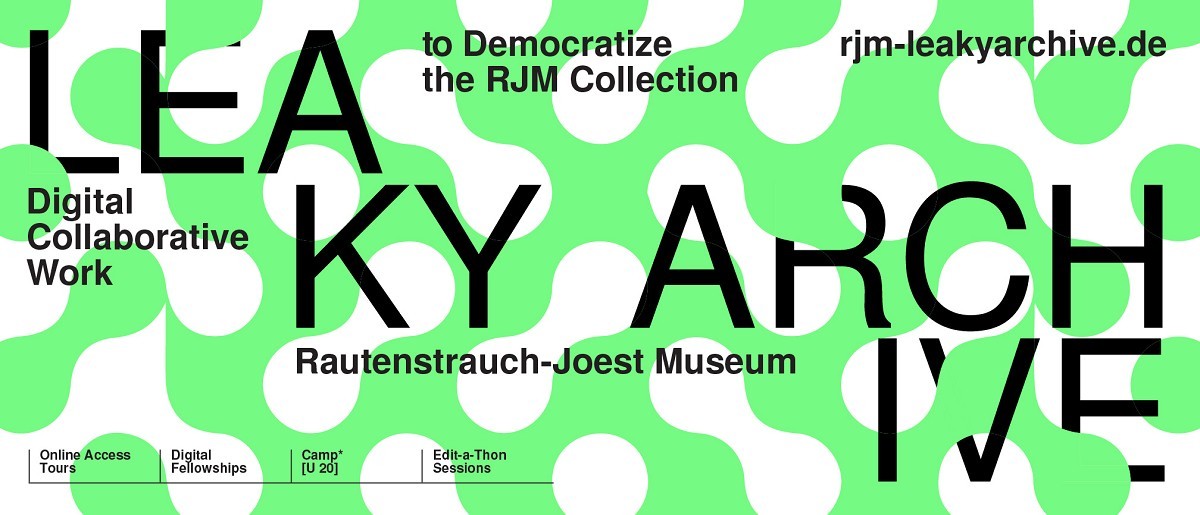Leaky Archive
Leaky Archive is the digital project at the Rautenstrauch-Joest Museum (RJM). The ambition of the project is to work collaboratively on the collection in digital and analog spaces in order to make both content and structure more democratic, open and polyphonic.
How can the RJM's collection database, with around 165,000 entries, most of which contain minimal information, be more transparent and accessible? Leaky Archive explores and develops new models for knowledge sharing and knowledge generation in collaboration with local and international institutions, peers, and publics to build an intersectional community. Digital fellowships, Online Access Tours through the digital collection, transdisciplinary work sessions and edit-a-thons, and a Camp* on programming, theater, design and gaming at the museum for youth are meant to transform the colonial archives and collections of the RJM into a multiperspectival-multivocal platform.
The project investigates how access to and work with colonial archives and collections can be radically transformed and opened up with the help of digitality. Essential to this process are the questions of how collections can embrace different, non-academic forms of knowledge, such as those related to orality and physical embodiment.
Leaky Archive focuses on new perspectives of digital collaboration through decentralized infrastructures. The different formats explicitly emphasize contradictory forms of knowledge and insight generation, rather than insisting on consensus. Thus, the project does not aim to transfer analog ideas into digital space or to accumulate knowledge, but rather to question the RJM collections as a model for ethnological collections, the effects of their digitization, the possibilities of their mediation, and their radical democratization.
BACKGROUND
Located in Cologne, the Rautenstrauch-Joest-Museum (RJM) is one of the most important ethnological museums in Germany and the only one of its kind in North Rhine-Westphalia. The collection contains approximately 65,000 objects and 100,000 historical photographs dating from the early days of photography to the 1980s. The RJM's collections have been successively recorded electronically in an Access-based database since the late 1990s. Since the migration of the records in the fall of 2020, they have been cleaned up, thesauri developed, and missing data - if available - added. In terms of content, the RJM collection represents a unique documentation of life in the global South, but can only be received in connection with colonialism and its legacies.
DESTINATION
With Leaky Archives, the RJM team is self-critical, as well as modeling questions such as: Who owns the rights to the images of once-looted objects contained in the database? Even if they are made available online to a wider public, who are the owners of these images? Digital networking creates the opportunity to discuss these and other questions directly with members of the communities who produced the artworks and objects or who are featured in the photographs, without dislocation. Their communities in the Global South and their local resources could help advance and, most importantly, recontextualize the debate and work on the collection. In this way, the project can be seen as part of a restitution process in which the database and its records can themselves become objects and return to their original communities.
Concept and project coordination: Agustina Andreoletti
RJM project team: Paulina Seyfried, Camilo Sandoval
KHM project team: Prof. Luzius A. Bernhard, Sam Hopkins
RJM Collection - Supporting Program - Documentation: Carla de Andrade Hurst (Diversity Manager), Caroline Bräuer (Photographic Collection), Nadine Dobler (Documentation). Lucia Halder (Photographic Collection), Dr. Clara Himmelheber (Collection Africa), Iris Kaebelmann (Public Program), Susanne Kube (Documentation), Dr. Oliver Lueb (Oceania Collection), Ricardo Márquez Garcia (Junior Curator), Vera Marušić (Directorate Officer, Program and Strategic Planning), Sonja Mohr (Insular Southeast Asia Collection), Aurora Rodonò (Diversity Manager), Mahtab Salmannia (Documentation), Dr. Anne Slenczka (Americas Collection), Nanette Snoep (Director), Dr. Annabelle Springer (Asia Collection).
Graphic design: Kristian Henson
Leaky Archive is developed as part of dive in. Programm für digitale Interaktionen of the Kulturstiftung des Bundes (German Federal Cultural Foundation) with funding by the Federal Government Commissioner for Culture and the Media (BKM) through the NEUSTART KULTUR programme.
The Digital Fellowships are funded by the Ministry of Culture and Science of the State of North Rhine-Westphalia in the Medienkunstfonds (Medienwerk.NRW) und Stadt Köln.
The Academy of Media Arts Cologne - Research Group Networks (KHM) is project partner.
